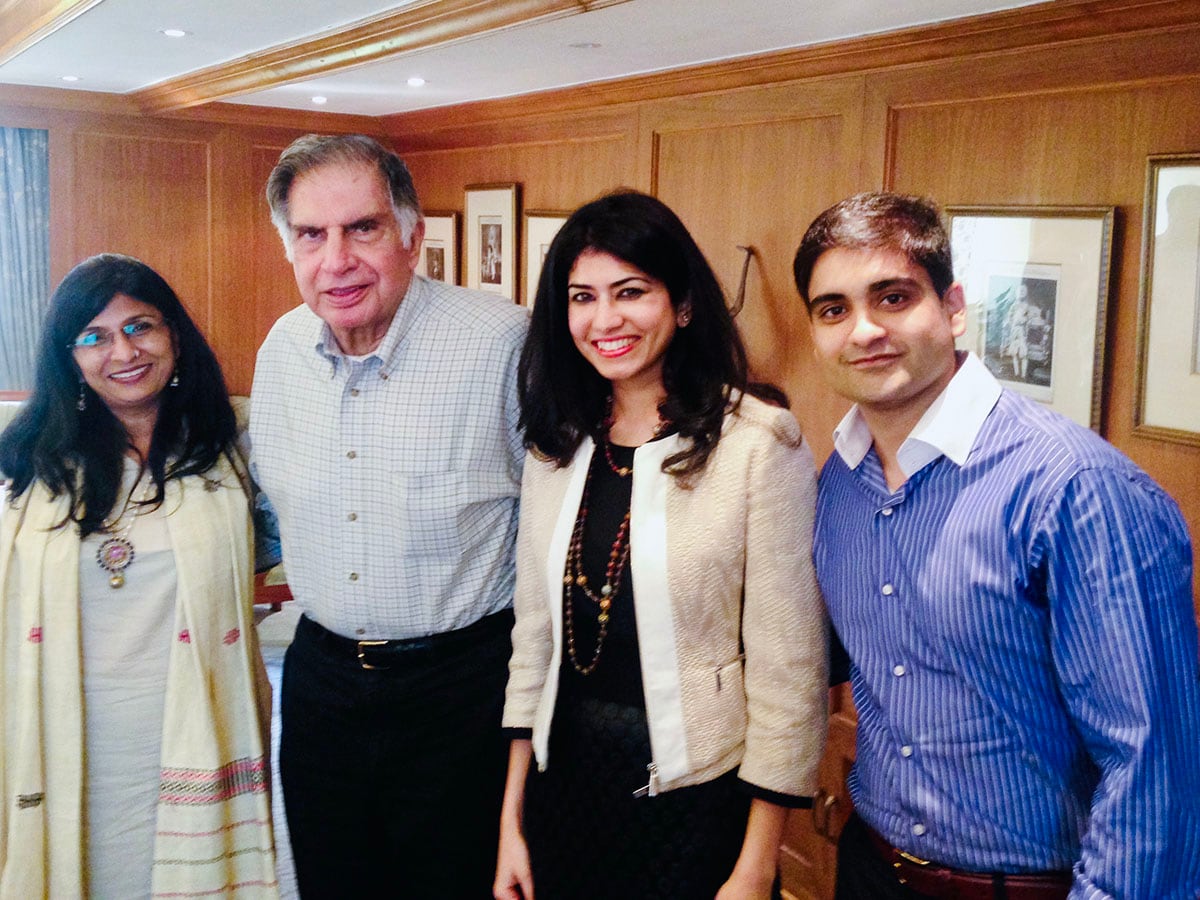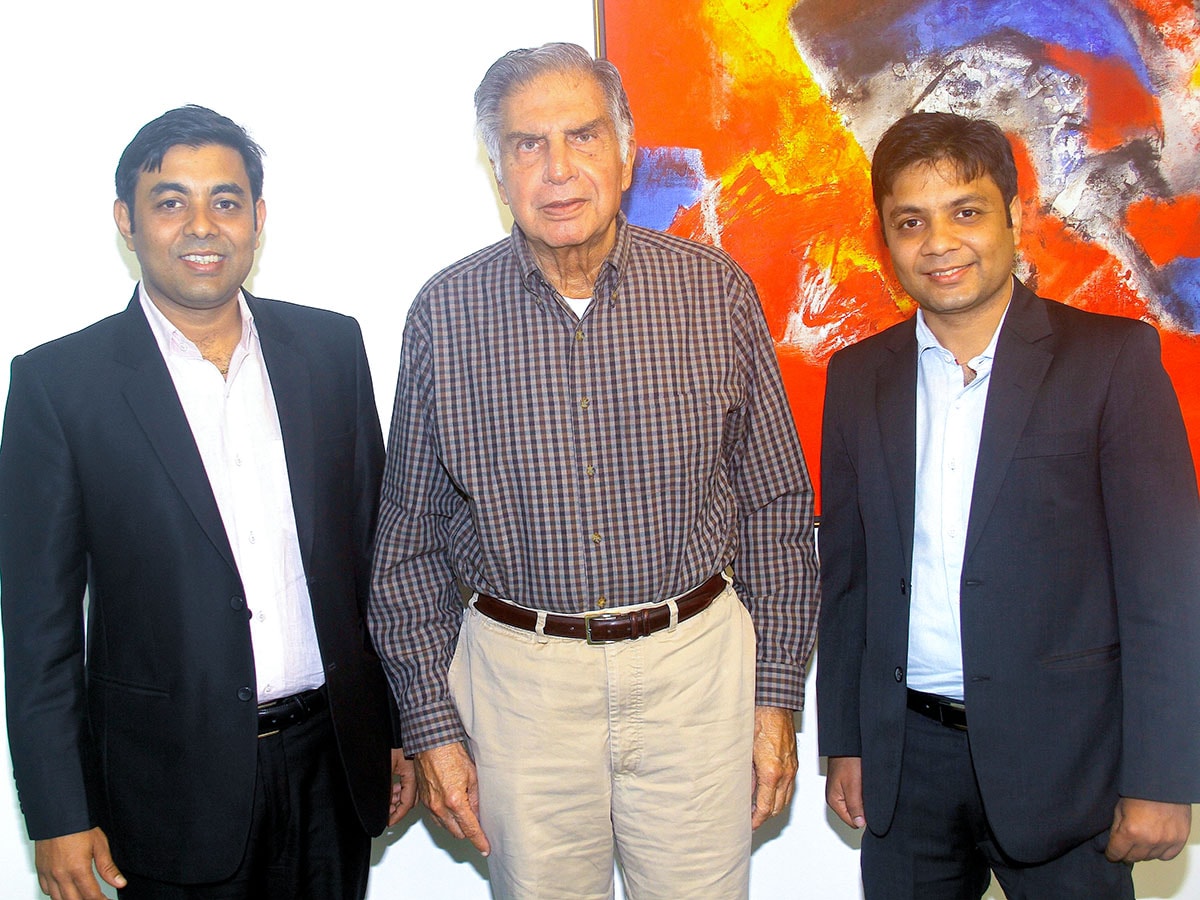 CashKaro co-founders Swati and Rohan Bhargava, with Ratan Tata
CashKaro co-founders Swati and Rohan Bhargava, with Ratan Tata
In early October, Upstox flaunted a staggering data point. “Mr Tata’s stake in Upstox has registered a whopping 23,400 percent return on the investment made in 2016, based on Upstox’s last round valuation of $3.5 billion,” the digital broking and wealth management platform underlined in its press release on October 6, alluding to a share buyback of 5 percent of Ratan Tata’s stake in the startup. Four days later, as the world woke up to the news of the death of the iconic industrialist, the co-founder and CEO of Upstox completes the stake story and tells us about the lopsided nature of the bargain. “Priceless,” reckons Ravi Kumar, alluding to his gains from the investment made by the legendary chairman emeritus of Tata Sons. In 2016, Tata reportedly bought around 1.33 percent stake in Upstox.
Kumar recounts a slew of invaluable lessons that he learnt from the humble founder. The first was always to do the right thing. “He always asked us to focus on customers,” says Kumar. Business, growth and money will follow if customer centricity is maintained. Another piece of gem was his take on corporate governance. “He always wanted entrepreneurs to keep a high standard of corporate governance and ethics in mind,” recounts Kumar, adding that the venerable business mogul has guided the journey of Upstox. “Whenever we are stuck in a difficult situation, we ask ‘How would Mr Tata deal with this issue?” says Kumar. “He has guided us like an invisible person in the room,” he adds.
If many founders were in awe of Tata’s piercing business sagacity, some would be mesmerised by his presence in the room. Swati Bhargava recounts her magical encounter in January 2016. The co-founders of cashback and coupon platform CashKaro—Swati and Rohan Bhargava—were in Mumbai to make an investment pitch. The venue was Taj Chambers. The husband-wife duo was fidgety, the occasion was overwhelming, and the excitement of pitching to the industry stalwart was punctured by a wave of unfounded fear that gripped the couple.
A few minutes later, a butler walked in to break the uneasy silence. “What would you like to have? You can order anything you want. This is Mr Tata’s chamber,” he said. The way Mr Tata took care of his guests, recalls Swati, would make one feel at home. “I ordered pancakes and strawberries,” she says. A few minutes later, the meeting started. “Mr Tata was sitting on one end of the meeting table, which resembled a long dining table,” she recalls, adding that there were other members from his investment team and a bunch of venture capitalists. “He had finished his lunch,” recounts Swati, who was impressed with his lavish dessert plate. “He finished all,” she says. “He enjoyed his meal,” she adds.
Also read: The RNT Legacy: From radios to semiconductors, high technology was his buzzword
The 20-minute meeting started on a sweet note. “My 85-year-old grandfather is excited to know that I am meeting you,” exclaimed Swati, adding that her grandfather had his first job at Tata Steel. Tata could not have hoped for a better dessert. “May I take a picture with you for him?” she requested. The gracious host obliged and started laughing. “Please convey my regards to your grandfather and thank him for his efforts,” he replied and effortlessly slipped into an engaging business conversation, which lasted well over the scheduled time.
 Car Dekho co-founders Amit and Anurag Jain with Ratan Tata
Car Dekho co-founders Amit and Anurag Jain with Ratan Tata
Towards the dying moments of the meeting, Swati shot her first question. “What do you think of our business?” she asked. Tata smiled. “In a country that loves to save, you are giving free money. What’s there not to love?” he laughed. Two weeks after the meeting, CashKaro became the third startup in 2016 to be backed by Tata. From customer acquisition to retention to supply to business partners and branding, the business magnate touched on all topics. “We were in awe of his humility and knowledge,” she says.
For Amit and Anurag Jain—the co-founding brothers who went to pitch CarDekho in 2015—the biggest takeaway was the unbridled enthusiasm of the seasoned entrepreneur to learn about the internet economy. “He seeded the idea of building an ecosystem,” recalls Amit. “He asked us to look at businesses and services which could be built around the core,” adds Anurag. In February 2015, Tata invested in CarDekho. In another meeting after a few years, the conversation revolved around business updates. “He would talk about the virtues of building a lasting company,” says Amit.
For over 50-odd startups—including Paytm, Ola, Lenskart, Firstcry and Snapdeal—that managed to get backing from Tata, the highest point of their entrepreneurial journey is not a valuation metric in entering the unicorn or a decacorn club but an endorsement from the man who shaped the business landscape of India. “Backed by Mr Tata is something that will always be close to our heart,” says Swati.
